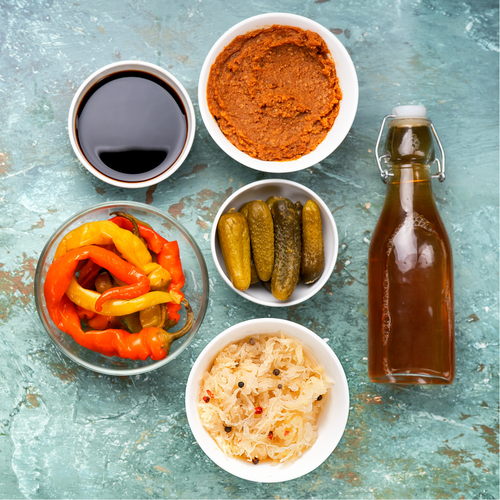What to remember:
Probiotics are live microorganisms that contribute to the balance of the intestinal microbiota.
They are found in fermented foods and some soy products.
Favor unpasteurized products to preserve a maximum of active probiotics and optimize their benefits.
Combine probiotics with prebiotics to nourish and strengthen the microbiota.
Introduce these foods gradually to avoid any digestive discomfort and allow the body to adapt smoothly.
What are probiotics?
Probiotics are live microorganisms (bacteria or yeast) that, when consumed in sufficient quantities, have beneficial effects on health, particularly by promoting the balance of the intestinal microbiota. They are found naturally in certain fermented foods, which we will see in this article, or in the form of dietary supplements.
The intestinal microbiota is the largest microbiota in the human body, with approximately 100,000 billion microorganisms. Its health depends solely on the balance between good and bad bacteria. When the flora is unbalanced, we speak of dysbiosis . Research highlights the dangers of this phenomenon. From simple inconvenience to more serious pathology, when the distribution of bacterial species is destabilized, the entire organism pays the price. The idea is therefore to have a majority of good bacteria to allow us to perpetuate the vital functions of our body: digestion, assimilation of nutrients, synthesis of vitamins, regulation of metabolic pathways and the immune system, etc.
The good news, however, is that it's relatively simple to restore a balanced and functional intestinal flora. Taking probiotics can be a valuable option, provided you choose the right strains and ensure the quality and quantity of the encapsulated bacteria are adequate to truly benefit from them. Diet also plays a key role, but where can you find probiotics naturally in your everyday foods? We'll explain everything!
What foods are rich in natural probiotics?
#1 - Fermented dairy products
-
Natural yogurts (with live cultures)
The term "yogurt" is strictly regulated and controlled. To qualify, a product must contain two specific strains: Lactobacillus bulgaricus and Streptococcus thermophilus . It is therefore essential to pay attention to the name of the products when shopping if you want to benefit from these natural probiotics.
-
Fermented milks
Fermented milks are obtained from the fermentation of Lactobacillus casei and Bifidobacterium animalis , which are naturally present in milk. These fermented milks include milk kefir (a creamy texture similar to yogurt), lassi, laban, and buttermilk. Naturally low in lactose after fermentation, they are often better tolerated than milk.
-
Some cheeses
Natural probiotics are found in many cheeses, including Gouda, Cheddar, Mozzarella, as well as in fresh and fermented cheeses (such as fromage blanc and faisselle), blue-veined cheeses (Roquefort, Fourme d'Ambert, Bleu, Gorgonzola, etc.), and soft cheeses with a bloomy rind (Brie, Camembert, etc.).
However, some beneficial bacteria do not survive aging or heat. To fully benefit from probiotics, it is best to choose cheeses made from raw or unpasteurized milk, and not too mature.
#2 - Fermented drinks
-
Kombucha
Kombucha is a beverage made from fermented black tea, cane sugar, yeast, and bacteria in symbiotic cultures. This mixture ferments for an average of two weeks before it can be enjoyed. This fermentation results in a slightly sparkling, tangy beverage rich in probiotics .
-
Fruit kefir
Fruit kefir is a probiotic-rich fermented beverage made by fermenting sweetened water with kefir grains, a natural blend of bacteria and yeast. Fruit (or water) kefir is sparkling and refreshing. It aids digestion, strengthens the gut microbiota, and supports the immune system. Like any fermented beverage, it should be consumed gradually to allow the body to adapt properly.
#3 - Soy derivatives
-
Soy products like tempeh have proven to be good sources of natural probiotics. Originating in Indonesia, this fermented soybean paste has other benefits: it's a good alternative to meat thanks to its high plant-based protein content, and the fermentation process helps reduce the phytic acid content of soy, which tends to hinder mineral absorption.
-
Miso is also a paste originating from Asia, obtained from the fermentation of rice, barley, and soybeans. It is added at the end of cooking in broths and soups, and it is very important that it does not cook to preserve its natural probiotics. You can also add it to your salad dressing; it will soften the mustard flavor, which can sometimes be strong.
-
Sauces fermented for 4 to 6 months, such as tamari sauce and shoyu soy sauce, are also sources of natural probiotics. Be careful, however, if you suffer from hypothyroidism, it is advisable to limit your consumption, especially when taking medication, because soy enzymes block thyroxine synthesis. They also have a very high sodium content, so it is best to moderate your consumption to maintain cardiovascular health.
#4 - Fermented vegetables
Fermented vegetables sold directly in unpasteurized vinegar brine commercially (such as pickles, capers) or made at home, fall into the category of foods naturally rich in natural probiotics.
In the second case, you need glass jars, water, salt, and of course, vegetables. After grating the vegetables, simply place them in the jars, packing them down to remove as little air as possible, and add the salted water (30 grams of salt per liter of water). After closing and waiting eight to ten days, a white deposit will form at the bottom of the jar, indicating that the fermentation has stabilized. The jars should then be stored in a cool place; tasting is possible two weeks after this step, and up to a year later.
Sauerkraut, kimchi, cabbages processed by lactic fermentation, are also rich in natural probiotic bacteria.
#5 - Other foods where you can find natural probiotics
-
Brewer's yeast or malted yeast
Brewer's yeast, commonly consumed for its benefits on skin, hair, and nails, is also gut-friendly! It contains a strain of yeast called Saccharomyces cerevisiae , which is known for its immune-boosting properties. It rebalances the microbiota by eliminating some of the harmful microorganisms that can colonize it.
-
Unpasteurized apple cider vinegar
Apple cider vinegar is also a natural source of probiotics. Be careful, however, to use unpasteurized vinegar, as pasteurization destroys bacteria that cannot tolerate heat.
-
Sourdough bread
Sourdough bread is a more digestible and nutritious alternative to industrially yeasted breads. Thanks to the long fermentation process involving lactic acid bacteria and natural yeasts, it develops better nutrient bioavailability and a reduced content of anti-nutrients such as phytic acid. Although baking destroys the majority of live probiotics, the metabolites produced by these bacteria, such as organic acids, remain beneficial for the balance of the intestinal microbiota. Thus, even if it does not directly provide probiotics, sourdough bread promotes better digestion and contributes to intestinal health.
How to properly consume these foods to optimize the benefits of probiotics?
As we have seen on several occasions, the ideal is to favor unpasteurized products without additives because heat destroys microorganisms and the absence of additives is a guarantee of quality.
It is also interesting to combine probiotics with prebiotics, which are the food for the living microorganisms that make up our intestinal microbiota. Prebiotics include dietary fiber (found in fruits, vegetables, legumes, whole grains, seeds, and oilseeds), resistant starch (obtained by refrigerating starchy foods for at least 6 hours, and also found in green or unripe bananas), polyphenols (which give food color), and fructans (found in leeks, beets, Jerusalem artichokes, artichokes, and bananas). It is recommended to include them in your diet to promote the healthy growth of the intestinal microbiota and thus contribute to its balance.
If you are not used to eating foods that are sources of pre- and probiotics, it will be wise to incorporate these foods gradually to avoid digestive discomfort.
Conclusion
By incorporating probiotic-rich foods into our diet, we actively contribute to the balance and diversity of our gut microbiota, with positive effects on digestion, immunity, and overall well-being. To maximize the benefits, it's essential to favor unpasteurized products and combine them with sources of prebiotics, which nourish these beneficial microorganisms. A gradual and varied consumption of these fermented foods helps avoid digestive discomfort while sustainably supporting our intestinal health. By adopting these good habits, we lay the foundation for a balanced microbiota, a true ally of our body.
Sources:
[1] Inserm. (2021). Intestinal microbiota (intestinal flora) . Accessed November 3, 2021, at https://www.inserm.fr/dossier/microbiote-intestinal-flore-intestinale/
[2] Elghandour, M., Tan, Z., Abu Hafsa, S., Adegbeye, M. (2020). Saccharomyces cerevisiae as a probiotic feed additive to non- and pseudo-ruminant feeding: a review. Accessed November 3, 2021, from https://pubmed.ncbi.nlm.nih.gov/31429174/
[3] National Institutes of Health, Office of Dietary Supplements (2023). Probiotics, Fact Sheet for Consumers. Accessed from: https://ods.od.nih.gov/factsheets/Probiotics-Consumer/#disc














